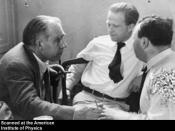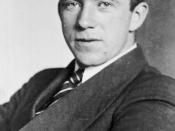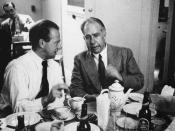"But why did he come?" There have been numerous interpretations put on this mysterious encounter. Did Heisenberg make the trip in hope of recruiting Bohr for his team of physicists? Did Heisenberg simply want to boast to his old teacher about how important he was in the Third Reich and that he was now the chief of the German bomb program? Or were the moral implications of the realization of a nuclear weapon far too great for him to proceed without the "absolution" from his former professor? Did Heisenberg actually want to propose that both sides refuse to make a bomb of such mass destruction?
Michael Frayn's new play, Copenhagen, concerns the race to build an atomic bomb in the second world war, in particular the motivation of the central character, Werner Heisenberg, who was in charge of the Nazis' nuclear program. Bohr, despite being half Jewish, was not persecuted and in 1941 Heisenberg came to see him; the outcome of that meeting has remained obscure and controversial ever since and is the main them of the play.
Heisenberg and Bohr are conceived as returning from beyond death to reenact their wartime meeting and imagining, or "draft", Heisenberg's motivation for the visit.
In this play three different versions of what actually went on are exposed. In the first version Heisenberg claims that he came to Copenhagen because of his moral dilemma of building a nuclear weapon. (P.36) "Does one as a physicist have the moral right to work on the practical exploitation of atomic energy?" But perhaps this question was just a pretext to get Bohr to reveal if indeed the Allies were building a bomb, which has also been an interpretation of the encounter. However Heisenberg apparently wanted the scientists on both sides to tell their governments that...


